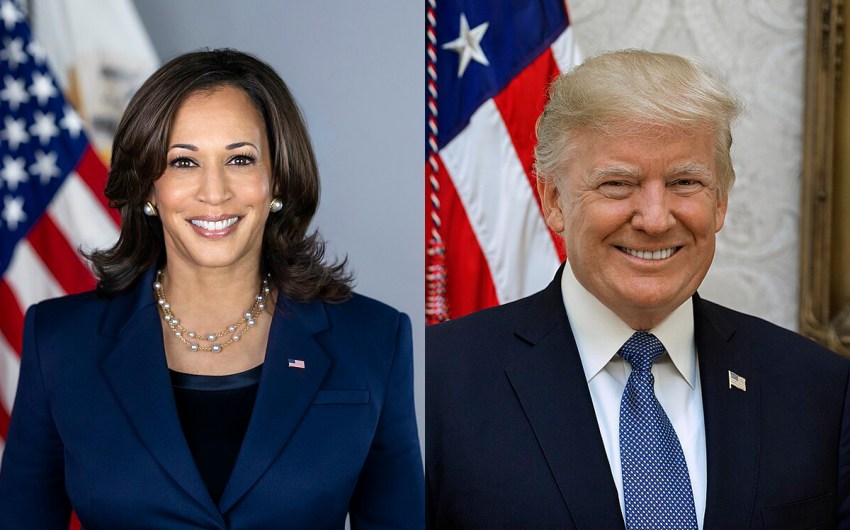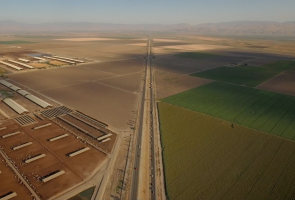Poised for a coronation celebration, Kamala Harris is set to accept the Democratic presidential nomination next week, holding a slight polling edge in an astonishing campaign Donald Trump was primed to win in a landslide 40 days ago.
The Democratic National Convention, opening Monday in Chicago, is expected to be a high-energy partisan bash in homage to Vice President Harris, who replaced President Joe Biden at the top of the ticket after his July 21 withdrawal. It was an unprecedented event, but only one in a stunning series during a summer of political drama.
With war raging in Ukraine and Gaza, the election’s historically high stakes — from Trump’s promise of mass deportations, expressed desire for autocratic powers, and bid to escape legal prosecutions to Harris’s bid to restore abortion rights, ban assault-style weapons, and expand the social safety net — augur more extraordinary developments, in the 12 weeks left before Election Day on November 5
Not least: the likelihood that the former Republican president would once again rally his supporters in refusing to accept the outcome if his Democratic rival triumphs.
“It has become now the standard position of the Republican Party,” Democratic voting rights lawyer Mark Elias said of the right-wing belief that Trump can lose only if the election is stolen.
Trump is just a month removed from a barely failed assassination attempt, during one of his raucous rallies on July 13. He appears to have been thrown off his bearings since Democratic elders forced Biden off the ticket eight days later. The president’s withdrawal followed a disastrous debate performance on June 27 that began the transformation of the race.
Since Harris cinched enough national delegate support to replace Biden early this month, Trump has flung a continuous series of racist, sexist, and often false personal attacks against her.
These often have come to the frustration of campaign strategists and establishment backers, who see a vast trove of policy vulnerabilities in the Democrat’s candidacy, from the economy and immigration to far-left elements of her record, as preferable targets.
At his own triumphant convention, which began just two days after the assassination attempt, Trump seemed on a glide path to recapturing the White House. As Biden kept sinking in the polls, senior Trump campaign aides boasted of their own brilliance to reporters, forecasting a “blowout win” in the Electoral College, sometimes speaking of themselves in the third person.
“People hire me to beat Democrats,” Trump principal strategist Chris LaCivita told a political writer for The Atlantic. “That’s what I do. That’s what Chris LaCivita does. He beats Democrats, period.”
That was then.
As the Democratic Convention signals the start of the home stretch of the campaign, here are five key questions that will shape the outcome of the Harris–Trump race.
Whose Message Will the Voters Buy?
At the June 27 debate, Trump prevailed in the first, and most important, mission of every political campaign: defining what the election is about. The 81-year-old Biden’s frail performance proved Trump’s theory of the case: He’s weak, and I’m strong.
At 78, however, Trump now is the old guy in the race, as the 59-year-old Harris swiftly sounded a generational argument to impose her definition on the election: “We are not going back!”
The strategy positioned her as the candidate of the future — traditional rocket fuel in presidential elections; it also makes headway, where Biden failed, in framing the contest as a referendum on Trump, whose endless grievance about the 2020 election makes him look stuck in the past.
Trump meanwhile has struggled to convey a clear and consistent contrast with Harris.
There is no lack of policy matters for him to work with, starting with voter anger about the administration’s handling of immigration, as well as grocery and gas prices; that’s not to mention high-profile scandals from her time as San Francisco’s district attorney, or a batch of far-left positions she struck while competing to be the most “progressive” wannabe in crowded 2019 debates for the 2020 Democratic nomination, when she supported decriminalization of illegal border crossings and a ban on fracking while flirting with the defund-the-police movement.
To the chagrin of many Republicans, however, an undisciplined Trump has wildly lashed out at Harris with attacks based on her identity or the size of her crowds, rather than defining the election as an ideological contest against what his campaign calls “the most radical ticket in American history.”
Harris has quickly tried to walk back her embrace of far-left stances from 2019 but has yet to explain how and why she came to take them, or how and why she changed her mind. Thus she remains vulnerable to Trump painting her as a dangerous lefty; once early excitement about her candidacy wears off, she still needs to define herself before he does it for her.
Who Solves the Electoral College Calculus?
As every schoolchild knows, a presidential election is not a national popular vote, but a series of state races — 51 counting the District of Columbia. Each state’s Electoral Vote (EV) total is equal to its two senators plus its number of House of Representative members. With 538 total EVs, it takes 270 to win.
The essential EV arithmetic of 2024 is this:
- Democrats have a reliable base of 226 EVs from 19 “blue” states, plus D.C., which they are all but certain to win.
- Republicans begin with a base of 235 EVs, from 25 “red” states.
- To get to 270, Harris needs 44 more votes, and Trump only 35, from some combination of the remaining 77 EVs from the six most competitive states: Arizona (11), Georgia (16), Michigan (15), Nevada (6), Pennsylvania (19), and Wisconsin (10).
When Biden was the candidate, Democrats had all but given up on the three Sunbelt states — Arizona, Georgia, and Nevada — which he won in 2020, but where Trump this time held prohibitive leads. The president’s only pathway was through the three Midwestern states.
Now, however, Harris has swiftly expanded the electoral map by erasing the gap in those three states, while also moving slightly ahead in Michigan, Pennsylvania, and Wisconsin.
Both now have multiple avenues to 270, with Pennsylvania the most crucial battleground.
This explains lingering trepidation among some Democratic strategists over her selection as a running mate of Governor Tim Walz, from reliably blue Minnesota, instead of Josh Shapiro, the very popular governor of Pennsylvania. He may not have guaranteed a Harris victory there, where her past opposition to fracking is poison, but clearly would have boosted her chances substantially.
Will There Be Debates and, If So, How Many?
The Harris and Trump camps have ostensibly agreed to meet in one debate, on ABC on September 10.
Trump is demanding three debates (Pro tip: Whoever wants more debates in any election is losing) and peremptorily announced that the candidates would meet in two other settings, an authoritative announcement that lacked the rather essential ingredient of Harris’s agreement.
For many years, political conventional wisdom said that presidential debates really didn’t matter much; the Biden meltdown changed that thinking.
With the Trump–Harris matchup still a coin-toss contest, a huge audience for their debate(s) would be guaranteed, making the face-to-face meetings critical, if not determinative.
Has Trump Jumped the Shark?
Trump’s always eccentric behavior has grown increasingly more erratic since Harris replaced Biden.
To cite just three examples: He questioned her racial identity before a convention of Black journalists, saying Harris “turned Black” for political purposes; he peddled a wing-nut conspiracy claiming that images of tens of thousands of people at a Harris rally were AI-generated; he spun a false tale about flying in a helicopter with former San Francisco mayor Willie Brown, who used to date Harris, allegedly whispering unflattering stories about her as the chopper malfunctioned and nearly crashed.
Trump’s right-wing base, of course, remains unshakeable, regardless of how bizarre his behavior — recall his boast about shooting someone “in the middle of Fifth Avenue” and not losing support — but Harris and Walz seem to have gained traction with other voters, simply by labeling he and his running mate, Ohio Senator JD Vance, as “weird.”
It’s a seemingly childish attack that perhaps is more effective than Biden’s frequent stentorian denunciations of the former president as an “existential threat to democracy,” portraying him as a small, silly figure rather than a mortal danger to the republic.
Another factor: There is speculation among the pundit class about the psychological impact on Trump of cheating death, by a millimeter or so, in the assassination attempt barely a month ago.
Even before the shooting, there was a small but influential chorus among the ranks of mental health professionals who for years have presented arguments and scientific evidence attesting to Trump’s possible psychopathology.
The question of how he will react to the incredible stressors of a too-close-to-call presidential campaign over the next 12 weeks may present some intriguing, if not alarming, answers.
What Happens If Trump Loses?
Trump already is setting the stage to charge anew that the election was “rigged” and stolen from him — having succeeded in convincing a huge portion of Republicans to believe the Big Lie that this was the case in 2020.
This time, Republicans already have installed local and state election officials around the country who may be poised to refuse to certify genuine election results.
Although Congress has passed legislation to make it more difficult for Trump to try to use the “fake electors” scheme that he employed in 2020, Democrats fear his strategy this time would be to create enough confusion and delay in certifying state vote tallies to throw the election decision into the House of Representatives.
There, Republicans could prevail, because the choice would come down to a one-delegation-one-vote of the states; even if Democrats win a House majority in November, the GOP still is likely to control a plurality of state delegations.
Several hundred Trump extremists already are serving prison time for their roles in the January 6 violence — Democrats call it an attempted coup — that prevented a peaceful transfer of power for the first time in the nation’s history.
It’s not hard to imagine a replay.
Premier Events
Fri, Jan 23
5:00 PM
Santa Barbara
Divine I Am Retreat
Fri, Jan 16
6:00 PM
Santa Barbara
19th Annual MLK Jr. Holiday Celebration
Fri, Jan 16
9:00 PM
Santa Barbara
Eric Hutchinson at SOhO
Sat, Jan 17
7:00 PM
Santa Barbara
Santa Barbara Blues Society Presents Tommy Castro
Thu, Jan 22
3:00 PM
Santa Barbara
Grand Opening at Ghirardelli Chocolate & Ice Cream
Thu, Jan 22
6:30 PM
Santa Barbara
Boogie for our Bodies
Sat, Jan 24
7:30 PM
Santa Barbara
Sweet Home Santa Barbara-The Doublewide Kings
Sat, Jan 24
7:30 PM
Santa Barbara
Billy F Gibbons and the BFG Band
Sun, Jan 25
11:00 AM
Santa Barbara
18th Annual Santa Barbara Community Seed Swap
Mon, Jan 26
6:30 PM
Santa Barbara
Lucinda Lane Returns to SOhO
Tue, Jan 27
7:00 PM
Santa Barbara
CWC Docs: Pistachio Wars
Fri, Jan 23 5:00 PM
Santa Barbara
Divine I Am Retreat
Fri, Jan 16 6:00 PM
Santa Barbara
19th Annual MLK Jr. Holiday Celebration
Fri, Jan 16 9:00 PM
Santa Barbara
Eric Hutchinson at SOhO
Sat, Jan 17 7:00 PM
Santa Barbara
Santa Barbara Blues Society Presents Tommy Castro
Thu, Jan 22 3:00 PM
Santa Barbara
Grand Opening at Ghirardelli Chocolate & Ice Cream
Thu, Jan 22 6:30 PM
Santa Barbara
Boogie for our Bodies
Sat, Jan 24 7:30 PM
Santa Barbara
Sweet Home Santa Barbara-The Doublewide Kings
Sat, Jan 24 7:30 PM
Santa Barbara
Billy F Gibbons and the BFG Band
Sun, Jan 25 11:00 AM
Santa Barbara
18th Annual Santa Barbara Community Seed Swap
Mon, Jan 26 6:30 PM
Santa Barbara
Lucinda Lane Returns to SOhO
Tue, Jan 27 7:00 PM
Santa Barbara

























